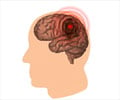Amniotic fluid was found to yield new and better treatment for ischemic stroke, stated a new study published today in
STEM CELLS Translational Medicine.
The secretome of amniotic fluid stem cells helps restore neuronal plasticity, improve cognition, replace neuronal neurons damaged or lost due to an
ischemic stroke, said the study led by Annamaria Cimini, Ph.D., of the University of L'Aquila, and Liborio Stuppia, M.D., of D'Annunzio University, Italy.
‘Exosomes may represent a suitable treatment for stroke injury.’
- Each year, 5.5 million people across the world die from stroke.
- More than 116 million years of healthy life are lost due to stroke-related death and disabilities.
- An estimated 87 percent - are the ischemic type.
- Ischemic strokes occur when a vessel supplying blood to the brain becomes obstructed.
- Tissue plasminogen activator (t-PA) is the current treatment.
"Thrombolytic therapy itself can lead to brain injuries, namely cerebral ischemia/reperfusion (I/R) injury. I/R injury is one of the major reasons for disability, high morbidity, and mortality worldwide," Dr. Cimini said.
Human amniotic fluid stem cells (hAFSCs) have emerged as a possible candidate in the search for better stroke treatment options due to their regenerative abilities and neuroprotective mechanisms.
In the current study, the Cimini- Stuppia team wanted to determine which signal transduction pathways might be activated by hAFSC-derived secretome during a stroke.
"Thus, exosomes offer an alternative therapeutic approach as a substitute for cell transplantation," Dr. Cimini said.
The hAFSCs cells showed a reduction in viability of about 50 percent.
Advertisement
"When we examined the results, we found that the hAFSC-derived secretome had activated pro-survival pathways, as well as pathways that halted apoptosis (programmed cell death).
Furthermore, microRNA analysis in the exosomal component revealed an abundance of miRNAs involved in protecting neurons and controlling neuronal cell death," Dr. Stuppia reported.
Advertisement
"These early pre-clinical results are certainly encouraging and demonstrate the need to further pursue human amniotic fluid stem cells-derived secretome as a regenerative cell therapy," said Anthony Atala, M.D., Editor-in-Chief of STEM CELLS Translational Medicine and director of the Wake Forest Institute for Regenerative Medicine.
"These outcomes suggest a potential approach that could change the outcome for millions of patients who suffer a stroke."
Source-Medindia
















